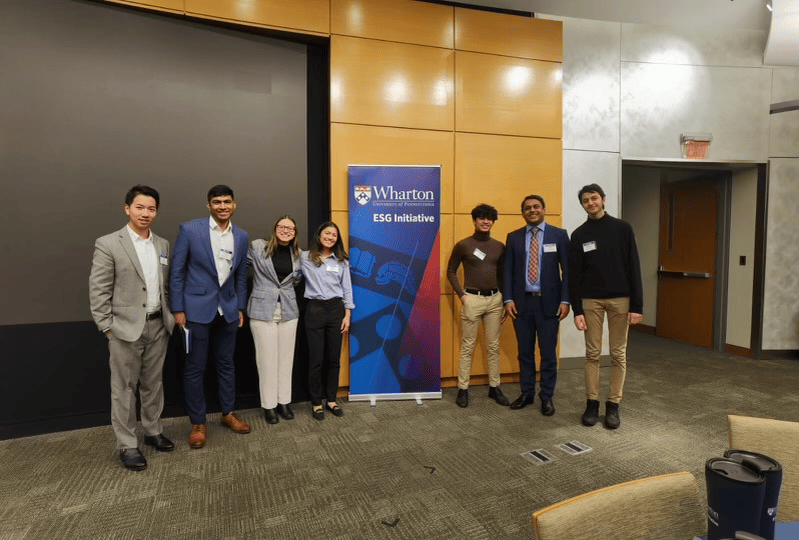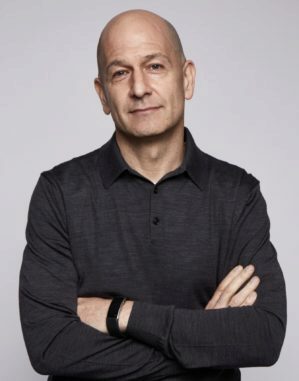The ESG Initiative at the Wharton School
Turner ESG Student Blogs
Leveraging ESG to Drive Health Impacts
Turner ESG Fellow and WIVA Investment Associate Teodora Dragic, C’25, explores how businesses can invest in the social determinants of health and the communities they operate in.
It is often assumed that medical or clinical care factors inform the majority of a person’s healthcare outcomes. However, up to 80% of our health is actually caused by social and environmental influences. These are known as the social determinants of health.
More formally, the social determinants of health are defined as nonmedical factors that can influence how our health plays out. The five major social determinants of health are economic stability, education access, healthcare access, built environment, and community context. As someone greatly interested in pursuing health policy work, I hadn’t considered how the buzzing ESG space would be able to play a role in helping improve healthcare outcomes.
It is no secret that there is plentiful capital driving the ESG sector forward globally. $12 trillion assets under management in 2018 incorporating ESG grew to $17.1 trillion by the start of 2020. ESG assets are estimated to account for 1/3 of all assets under management, with the total assets expected to exceed $50 trillion by 2025. There is obviously plentiful backing and with this comes shifts in the private sector. Environmental impact is being assessed against quantitative metrics. As Professor Djordjija Petkoski argued in a Turner ESG seminar, governance is being held accountable for items from communication with shareholders to clear labor rights.
However, the “Social” component of ESG is somewhat more difficult to track as it emphasizes qualitative factors. Thus, there can be emphasis on more “trackable” measurements such as health and more explicitly the social determinants of health.

Through joining the Turner Environmental, Social, and Governance (TESG) Fellowship, I’ve learned an extensive amount of different sectors that fall under ESG that could positively influence social determinants of health. Furthermore, ESG more generally can be restructured to more explicitly include healthcare concerns given how much the private sector influences health.
The health of a population should be one of the foremost priorities of a business. Simply put, businesses can’t operate without people. The employees, consumers, and communities in which a business operates are all contingent on its success. By championing health and focusing on social determinants of health, businesses can minimize things like absenteeism, heighten productivity, and lower litigation risk.
With a shift towards social determinants of health and data driven solutions for enhanced healthcare, businesses can invest in health as opposed to management of healthcare. Our health default is sick, and our private sectors operate not to mitigate poor health outcomes but under the assumption that poor health can be balanced. This is not the case. Businesses can invest with social responsibility in mind and become deeply involved in initiatives or pilots of groups such as the Center for Disease Control (CDC) which emphasize preventative care like vaccines or banning harmful substances (ie tobacco). They could also harness and implement internal initiatives such as offering incentives for gym memberships or more equitable pay or ensuring safe working conditions.
Businesses should also recognize the spaces that they operate in. This primarily focuses on working alongside communities and municipalities of locations in which they have offices or impact. For example, businesses could expand capital on investing in green spaces or affordable housing in a neighborhood as opposed to attempting to expand invasively.
Companies themselves also need to be held accountable for inequitable actions that harm health or social determinants of health. This brings in the practice of impact investing which was described by Professor Katherine Klein to myself and other TESG fellows. A strong advantage that ESG-focused investors and funds have is the ability to divest and reallocate capital to firms and organizations that are providing more transparency on how they are positively influencing health.
A challenge here, on the other hand, is that many existing companies that are attractive investments could be producing products that are bad for factors influencing health outcomes. For example, a major influence of health is the built environment. Thus, even if a company claims to be doing good for the environment they may actually be harming it through other practices. A notable example is Ford. Ford recently released an Electric Pickup Truck model; while electric cars have widely been accepted as better alternatives of transport, this particular truck is being built from harmful metal. Specifically, the aluminum is being sourced from a refinery in Brazil that has polluted the Amazon and harmed the health of many indigenous groups. By continuing to invest in Ford and push capital towards these new electric trucks, there could in fact be adverse health outcomes for other groups of people.
This is why proper analysis is a massive priority in the ESG and impact investing space, a factor I was taught not only as a TESG fellow but also as an investment associate for the Wharton Impact Venture Associates (WIVA).
To that end, it is also vital to consider measurable impact when investing for health. What this means is that investors and companies themselves should be able to accurately assess how their health initiatives are impacting outcomes in the short term and long term. Thus, healthcare initiatives should be rooted in measurable models. For example, if investing in education, a company should be able to track how many more children in a particular high school have gone on to college and then stayed in college to finish a degree. There is even potential for partnership or studies alongside local universities in order to prioritize factors that are informing health outcomes.
Being from New York City, I know that in urban spaces especially, there are challenges in persisting in college. For example, students from NYC have a 39% college continuation rate. What this means is that post-enrollment only 39% of students from NYC will continue college for at least two years. This is a shocking statistic and one that directly correlates with poor health outcomes (due to conjunctions with economic stability, job access, etc). Thus, I have worked specifically on edTech-focused companies as an impact investor analyst for the Wharton ESG Initiative. I want to drive direct societal impact in the health sector by focusing on social determinants of health.
While I’ve begun making my mark through the ESG Initiative, I hope I have provided more research conclusions that will aid the private sector in addressing health.
Essentially, there are countless ways through which a company and the private sector more broadly can assess the health impact they can have. It needs to be rooted in ESG principles and data-driven missions. Without thorough information to back it, it would be challenging to determine how particular sectors of a business can impact health for the better or worse.
By Teodora Dragic
Views and opinions expressed here are those of the author and do not necessarily reflect the official position of the ESG Initiative at the Wharton School or the Wharton School.
Turner ESG Fellows

Turner ESG Fellows are a group of 20-25 undergraduates across Penn who participate in a year-long program of speaker sessions, networking opportunities, and professional development across many ESG topics. Alongside their peers, they develop a working knowledge of real-world environmental, social, and governance topics, learn about different ESG career options both in academia and industry, and network with other students, faculty, and professionals. They also benefit from mentorship and community-building opportunities, led by our returning Turner ESG Senior Fellows.
Teodora Dragic,
C’ 25

Teodora is a Junior in the College who is heavily engaged with the ESG Initiative. She worked as an associate for the Wharton Impact Venture Associates (WIVA) Program and was a member of the Turner Environmental, Social, and Governance Fellows. She looks forward to continuing her involvement with the Initiative and engaging in coursework and activities related to ESG.

The support and vision of impact investor Bobby Turner, W’84, catalyzed the launch of the Turner Environment, Social and Governance (ESG) Fellows.
As a longtime supporter of social impact activities at Wharton, Turner – CEO of Turner Impact Capital – is an example of, as Joseph Wharton said, harnessing the power of business to “solve the social problems incident to our civilization.” He also helps inform the ongoing priorities and future direction of the Wharton School as a member of the board of overseers. The ESG Initiative is very grateful to Lauren Golub Turner, W’85, and Bobby Turner, W’84 for their support.
DISCLAIMER:
Neither the University of Pennsylvania, the Wharton School, Wharton Impact Venture Associates (WIVA), nor any of their respective students, faculty, directors, officers, employees, representatives, affiliates, or agents (collectively, the “Penn Parties”) (i) is acting as underwriter, broker-dealer, promoter, financial advisor, or other intermediary with respect to any offering of securities by any entity mentioned in this article, or (ii) has received or will receive any compensation from any person or entity as an incentive to publish of this article. In addition, the Penn Parties have not received and will not receive any compensation or other item of value in connection with any possible or future investment in any securities issued by any entity mentioned herein.
Any research or diligence described above (i) was performed by WIVA solely for its own, limited, educational purposes, and not for the purpose of aiding any person in making any investment decision, and (ii) may be limited and incomplete, by its very nature, as a result of limited publicly available information and other limited information voluntarily made available to WIVA. No Penn Party shall have any liability whatsoever arising from any error or incompleteness of fact or opinion in, or lack of care in the preparation or publication of, this article.
Copyright ©2023 the Wharton School. All rights reserved. The information, methodologies, data and opinions contained or reflected herein are proprietary of the Wharton School and/or its students, are intended for non-commercial use, and may not be copied, distributed or used in any way, including via citation, unless otherwise explicitly agreed in writing. They are provided for informational purposes only and (1) do not constitute investment or financial advice; (2) cannot be interpreted as an offer, indication, solicitation, or recommendation to buy or sell any securities or to undertake any kind of business transactions; (3) do not represent an assessment of any issuer’s economic performance, financial obligations nor of its creditworthiness; and (4) are not a substitute for a professional financial, legal, and tax advice.


